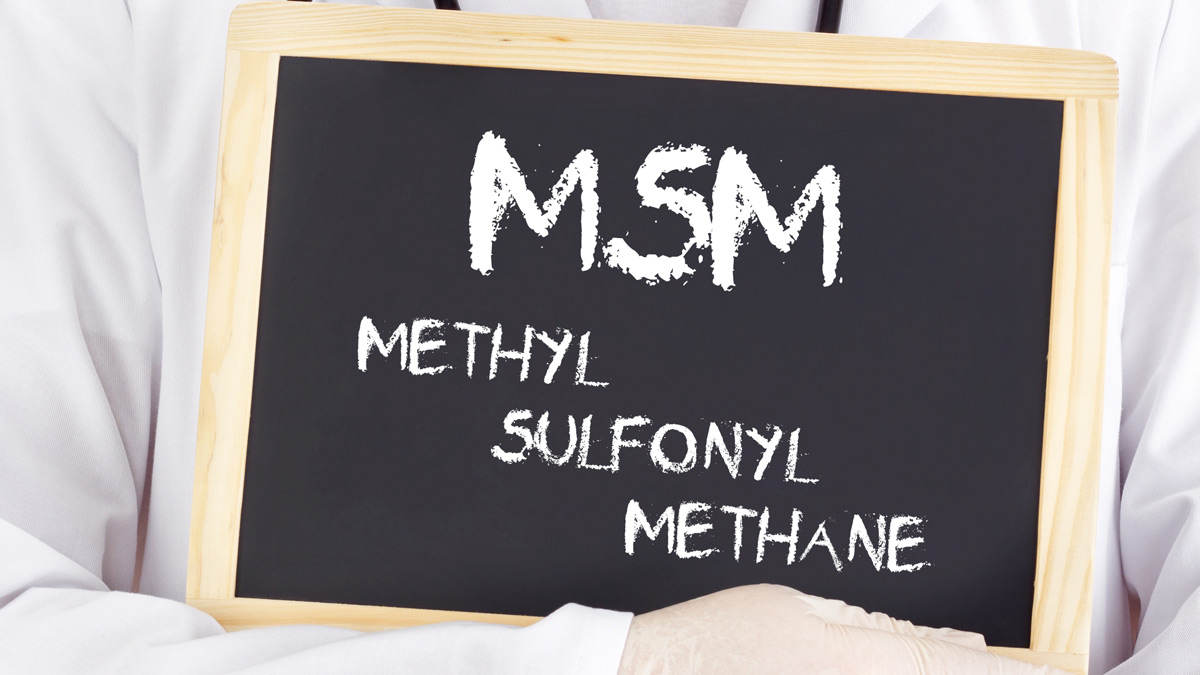MSM: the benefits of organic sulfur!
The experts at SuperSmart have put together the following guide which contains everything you need to know about MSM: its characteristics, properties, benefits, uses, doses and scientific opinion …

What is MSM?
Before we go any further, let’s first define MSM: it’s the abbreviated form of methyl-sulfonyl-methane, a molecule found naturally in many mammals and plants. Scientists describe MSM as an organic sulfur-containing compound, ie, a source of organic sulfur! As such, it offers huge potential since organic sulfur is absorbed by the body and plays a major role in our health.
What is sulphur’s role in the body?
Sulfur is a trace-element, the importance of which is often underestimated. It’s sometimes even confused with the toxic substance sulfur dioxide, an irritant gas responsible for many of the risks posed by air pollution. In distinct contrast to sulfur dioxide, sulfur is a compound essential for optimal health. It is part of the composition of certain amino acids, and thus a great many proteins. It constitutes a key element in the structure of joint cartilage and connective tissue such as the dermis. In other words, sulfur is found throughout the body and contributes to general well-being.
Why should you be interested in the benefits of sulfur?
Essential for optimal health, sulfur is a mineral with multiple benefits. Legend has it that it was used as far back as the Middle Ages as a natural remedy for many everyday ailments. However, it is in the field of thermalism – the therapeutic use of hot water springs - that sulfur has proved most successful. Waters rich in sulfur, or sulphurous waters, have been used and consumed by healers for many years for their therapeutic virtues. Supplementing with sulfur is particularly recommended as a natural treatment for arthritis for easing joint pain, as a remedy for respiratory infections, and as a treatment for certain skin diseases such as psoriasis or rosacea.
Why supplement with MSM?
Thermal waters are not the only way of obtaining sulphur’s benefits. Since the 1990s, MSM supplements have been available, such as the patented product OptiMSM®. These supplements are the result of many years’ research. Indeed, it’s worth noting that MSM was discovered in the 1970s by veterinary medicine researchers who noted the compound’s benefits for combatting inflammatory problems in the muscles, bones and joints in several animals. Following their discovery, further studies evaluating MSM’s therapeutic potential in humans clearly showed that MSM supplements offer numerous benefits for our health and well-being.
What are the benefits of MSM?
For the last 30 years, studies have led to improvements in our knowledge of MSM’s properties. To understand them, it’s important to remember that to supplement with MSM is to supplement with organic sulfur. By definition, organic sulfur is bioavailable, ie, it can be absorbed and used by the body. Once ingested, MSM can be used as a source of organic sulfur for producing certain key compounds including two natural amino acids: methionine and cysteine. These two amino acids can be thought of as ‘bricks’: they serve as building blocks for many proteins in the body. For example, methionine and cysteine form part of the composition of keratin and collagen. These two proteins play a key role in the structure of the hair and nails respectively, and help maintain connective tissue such as the dermis, tendons and joint cartilage. In other words, supplementing with MSM offers multiple benefits in terms of improved joint comfort, stronger hair and nails and healthier skin …
How effective is it for arthritis?
It’s not by chance that MSM is often suggested as a remedy for arthritis. A number of studies have confirmed its benefits for relieving arthritic joint pain. Commonly-seen in the over 65s, arthritis is a disease of the joints characterised by gradual destruction of cartilage. Several approaches have shown positive results in combatting this process, including supplementing with MSM. Its advantages for treating arthritis appear to be twofold . On the one hand, it is believed to have an anti-inflammatory action which relieves pain in the joints. On the other, by providing organic sulfur, MSM promotes natural production of collagen, one of the essential components of cartilage. Providing rapid and localised relief for the joints, MSM has been incorporated into creams such as the product Smart joints cream.
How does it benefit sports enthusiasts?
MSM’s benefits for the joints are by no means restricted to those suffering from arthritis. They can also be very useful for sportspeople, especially those who like running. In addition to its effects on joint protection and comfort, MSM has been scientifically shown to offer advantages in improving recovery and reducing the risk of injury and muscle pain. Some scientists suggest these benefits are linked to potential antioxidant activity, with further studies underway in this area.
How does it benefit the hair and nails?
To understand how MSM benefits the hair and nails, we need to remember that it promotes the production of natural keratin, the importance of which is now widely-recognised. A lack of keratin, especially due to inadequate sulfur levels in the body, can be responsible for weak hair and brittle nails. By providing the body with organic sulfur, MSM thus helps to keep the hair and nails in good condition. Hence its inclusion in the composition of nutricosmetics such as Hair & Nails Formula.
What are its effects on the skin?
The cosmetics industry has for some years also been interested in the benefits of MSM for the skin. Studies show that this sulfur-containing compound offers protective effects for the skin which could help combat premature aging of skin cells. In addition, researchers have observed that MSM may also have therapeutic potential for certain skin disorders such as psoriasis and rosacea.
MSM and allergies?
You may have heard about MSM’s potential for relieving allergies. It is one of the latest discoveries in relation to this compound. Scientists have demonstrated positive effects for the care of allergic rhinitis the seasonal form of which is often referred to as hay fever. Symptoms of this allergic reaction are essentially a runny nose and sneezing. Preliminary observations suggest MSM supplementation can reduce these symptoms, with confirmation of these positive findings awaited from additional studies.
MSM and detox treatments?
In just a few years, MSM has become a supplement of choice for detox treatments. And with good cause, as it offers several advantages for in-depth detoxification of the body. Firstly, the sulfur provided by MSM is an excellent chelator of heavy metals. This means it helps eliminate heavy metals such as aluminum, lead and mercury that accumulate in the liver. Studies also show MSM can help cleanse the body by improving cell membrane permeability, a process which promotes the elimination of toxins by cells. Suffice to say that this compound could prove very useful for your next detox treatment!
MSM: what does the scientific community think?
By now you will have realised that MSM is a compound which is of major interest to the scientific community. Relieving arthritis, improving hair and nail health, protecting the skin, alleviating allergies, and contributing to detoxes … the benefits of MSM are many and varied and have been the subject of numerous studies. According to scientific opinion, we have not seen the last of the health benefits offered by MSM. The latest studies show that supplementation could have anti-cancer potential, benefits for reducing snoring and positive effects in fighting systemic erythematosus lupus. New findings should enable researchers to determine the extent of its properties.
What is the right dose to take?
As yet, there is no actual recommended dose for MSM. The dietary supplements currently available are generally offered at 1.5g a day, an amount which is usually spread over two or three doses. However, it’s worth noting that researchers have found doses of between 1 and 6g a day to produce positive results. Your therapist may sometimes choose to increase the dose according to your needs, or advise you to combine it with other active principles. In the case of arthritis, he or she may steer you towards products such as Joint Support Formula which combines MSM with glucosamine, chondroitin, hyaluronic acid, silicon, manganese, vitamin C and boron. These compounds act together to improve joint comfort.
Are there any contraindications?
MSM is well-tolerated by the body, as long as you follow the recommended doses. As with any active principle, taking more than the recommended amount can cause unwelcome effects such as gastrointestinal problems (nausea, bloating, constipation, diarrhea …), allergies, rashes and headaches. As a precaution, MSM supplements are not recommended for children, women who are pregnant or breastfeeding, those suffering from kidney problems or those undergoing chemotherapy. If in doubt, seek medical advice.
What are the key points to remember about MSM’s benefits?
This article gives an overview of the properties of this sulfur-containing compound. To summarise, here are the key areas in which scientists believe MSM offers benefits:
- promoting joint comfort;
- treating arthritis;
- improving hair health;
- strengthening the nails;
- protecting the skin;
- detoxing the body;
- relieving seasonal allergies.
References:
- Kim YH, et al. The anti-inflammatory effects of methylsulfonylmethane on lipopolysaccharide-induced inflammatory responses in murine macrophages. Biol Pharm Bull. (2009)
- Magnuson BA, Appleton J, Ames GB. Pharmacokinetics and distribution of {35S}methylsulfonylmethane following oral administration to rats. J Agric Food Chem. (2007)
- Notarnicola A, et al. Methylsulfonylmethane and boswellic acids versus glucosamine sulfate in the treatment of knee arthritis: Randomized trial. Int J Immunopathol Pharmacol. 2016 Mar;29(1):140-6.
- Barrager E, et al. A multicentered, open-label trial on the safety and efficacy of methylsulfonylmethane in the treatment of seasonal allergic rhinitis. J Altern Complement Med. (2002)
- Berardesca E, Cameli N, et al. Combined effects of silymarin and methylsulfonylmethane in the management of rosacea: clinical and instrumental evaluation. J Cosmet Dermatol. 2008 Mar; 7(1):8-14.
- Usha P.R. et al. Randomised, double-blind, parallel, placebo-controlled study of oral glucosamine, methylsulfonylmethane and their combination in osteoarthritis. Clinical Drug Investigation, 2004 June, 24(6): 353-63.
- Jacob S.W. et al. The miracle of MSM. GB Putmann Sons, 1999.
- Horvath K. et al. Toxicity of methylsulfonylmethane in rats. Food Chem. Toxicol., 2002 Oct, 40(10):1459-62.
- Tennent DJ, et al. A randomized controlled trial evaluating methylsulfonylmethane versus placebo to prevent knee pain in military initial entry trainees. US Army Med Dep J. 2017 Oct-Dec;(3-17):21-25.
- Kang DY, et al. Methylsulfonylmethane Induces G1 Arrest and Mitochondrial Apoptosis in YD-38 Gingival Cancer Cells. Anticancer Res. 2017 Apr;37(4):1637-1646.
- Karabay AZ, et al. Methylsulfonylmethane Induces p53 Independent Apoptosis in HCT-116 Colon Cancer Cells. Int J Mol Sci. 2016 Jul 15;17(7).
- Butawan M, et al. Methylsulfonylmethane: Applications and Safety of a Novel Dietary Supplement. Nutrients. 2017 Mar 16;9(3).
References
- Kim YH, et al. The anti-inflammatory effects of methylsulfonylmethane on lipopolysaccharide-induced inflammatory responses in murine macrophages. Biol Pharm Bull. (2009)
- Magnuson BA, Appleton J, Ames GB. Pharmacokinetics and distribution of {35S}methylsulfonylmethane following oral administration to rats. J Agric Food Chem. (2007)
- Notarnicola A, et al. Methylsulfonylmethane and boswellic acids versus glucosamine sulfate in the treatment of knee arthritis: Randomized trial. Int J Immunopathol Pharmacol. 2016 Mar;29(1):140-6.
- Barrager E, et al. A multicentered, open-label trial on the safety and efficacy of methylsulfonylmethane in the treatment of seasonal allergic rhinitis. J Altern Complement Med. (2002)
- Berardesca E, Cameli N, et al. Combined effects of silymarin and methylsulfonylmethane in the management of rosacea: clinical and instrumental evaluation. J Cosmet Dermatol. 2008 Mar; 7(1):8-14.
- Usha P.R. et al. Randomised, double-blind, parallel, placebo-controlled study of oral glucosamine, methylsulfonylmethane and their combination in osteoarthritis. Clinical Drug Investigation, 2004 June, 24(6): 353-63.
- Jacob S.W. et al. The miracle of MSM. GB Putmann Sons, 1999.
- Horvath K. et al. Toxicity of methylsulfonylmethane in rats. Food Chem. Toxicol., 2002 Oct, 40(10):1459-62.
- Tennent DJ, et al. A randomized controlled trial evaluating methylsulfonylmethane versus placebo to prevent knee pain in military initial entry trainees. US Army Med Dep J. 2017 Oct-Dec;(3-17):21-25.
- Kang DY, et al. Methylsulfonylmethane Induces G1 Arrest and Mitochondrial Apoptosis in YD-38 Gingival Cancer Cells. Anticancer Res. 2017 Apr;37(4):1637-1646.
- Karabay AZ, et al. Methylsulfonylmethane Induces p53 Independent Apoptosis in HCT-116 Colon Cancer Cells. Int J Mol Sci. 2016 Jul 15;17(7).
- Butawan M, et al. Methylsulfonylmethane: Applications and Safety of a Novel Dietary Supplement. Nutrients. 2017 Mar 16;9(3).
Keywords
5 Days
Easy to navigate site
Easy to navigate site, had what I was searching for, good price. easy order-check out
James Tucker
11 Days
My skin is clearing up nicely!
Pretty good for my skin so far.
Christian
13 Days
The new packaging is excellent
The new packaging is excellent - finally! No more squashed boxes and torn envelopes.
GORAN
14 Days
Great Product
Great Product
Larry Garrett
19 Days
Quick shipping
Quick shipping; good price. No issues!
Mary McCarty
20 Days
Thr product is very good and is helping…
Thr product is very good and is helping me on my health. Then is always on time
LUGO Luz
23 Days
Buying was fine
Buying was fine. I had problems with the website not recognizing my login info, and had to call to get it fixed. Other than that, everything was good.
David S. Clark
23 Days
Your super maca and super ginseng are…phenomenal
Your super maca and super ginseng are phenomenal supplements that compliment each other when taking them together. Fantastic feeling of well-being and lots of mid day energy without the crash.
Keith Mason
26 Days
I have had amazing results with every…
I have had amazing results with every supplement I've purchased. I am extremely satisfied with this company
kirstin Torres
26 Days
Fine products
Fine products . They are on the leading edge of online supplements. The only issue -so far-is they sometime run out of subscription items.
Jason Argos
28 Days
The ordering process is very user…
The ordering process is very user friendly and the products always come in a timely manner.
CARTER Rhonda
29 Days
The price for Dr
The price for Dr. Pero's AC-11 is reasonable and in line with his views. (my former colleague). Keep it pure.
CAMPBELL Clayton
32 Days
Right on every time.
Right on every time.
Arthur Nicholas
35 Days
They are cheaper than everyone else and…
They are cheaper than everyone else and the shipping was fast. Great company.
Patricia Adams
42 Days
Availability of quality health…
Availability of quality health supplements and it's wide variety is impressive. Ordering is seamless and shipping even during the holidays is well streamlined.
Mohamad Hussein




